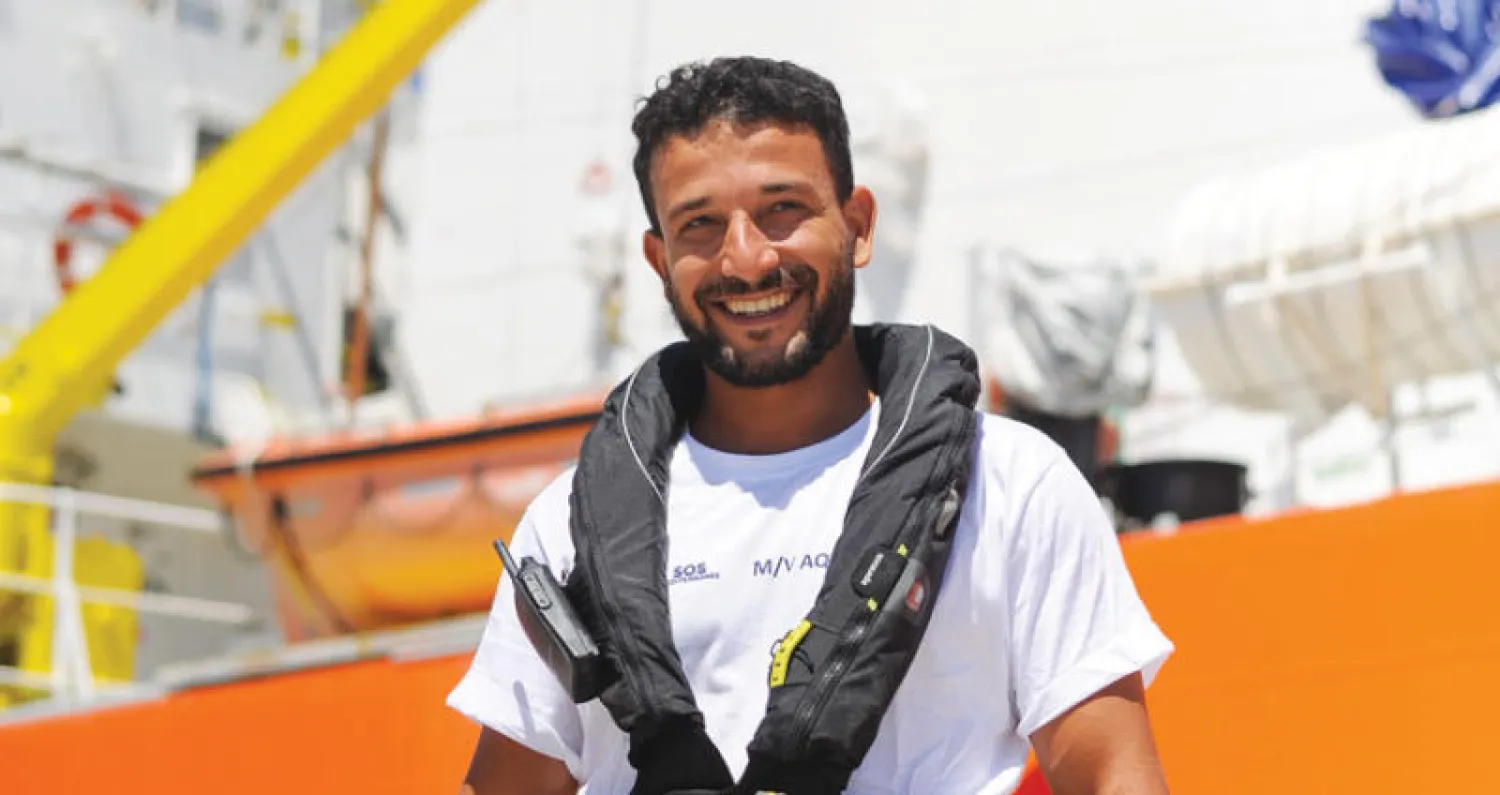Name: Hassan Ali Salem; Nationality: Egyptian-Italian; Age: 30; Occupation: Rescuer; Current address: MS Aquarius
At first glance, Hassan appears like a regular Arab youth who has lived in Europe for years. He is fluent in Italian and English, like thousands of others. After a few moments, it becomes clear that Hassan is not like other youths. He shoulders a different kind of responsibility, that of saving the lives of migrants at see and supporting them in a country, whose language they do not speak, but where they want to live.
A law graduate, Hassan had the choice to pursue a more profitable career, but he instead opted to work as a rescuer. The al-Faiyum native had arrived in Italy as an illegal immigrant. He had left Egypt to Libya and from there embarked on a dangerous journey to the shores of Italy’s Lampedusa.
He recalled to Asharq Al-Awsat how in December 2001, when he was just 13-years-old, he sailed on board a flimsy wooden vessel with 315 other people towards Lampedusa. An Italian coastguard vessel came to rescue the migrants and he recounted how the language barrier impeded the rescue effort.
“They tried to tug our boat with a rope, but it unfortunately, broke. This led to our boat capsizing due to the force of the waves... I ended up falling into the sea along with all other passengers. I did not know how to swim and I expected to die,” he added.
“I remember that someone ended up grabbing hold of my head and lifting me upwards. I can only remember the look on his face,” said Hassan tearfully. “I saw him die before my eyes.”
He then vowed to dedicate his life to saving lives and to migrants and asylum-seekers.
Hassan settled in the Italian town of Agrigento in Sicily. He was motivated to work with the migrants because he wanted to give them the help that was not available to him when he first arrived in Italy.
“Those people see no hope in their countries,” stated Hassan, who has spent six months on board the Aquarius as a rescuer and “cultural mediator.”
Prior to that, he had spent 12 years at various jobs in positions that the illegal migrants have to pass through, such as registration centers and camps.
Before joining the Aquarius, he worked with the Italian navy on the Mare Nostrum Operation that oversaw the arrival of 150,000 African, Middle Eastern and Central Asian migrants to Italy between 2013 and 2014. He then worked with Europe’s Frontex border agency and coastguard as part of Operation Triton, as well as a number of non-government agencies, such as Save the Children and SOS Mediterranee.
Hassan, like his fellow colleagues on the Aquarius, witnessed dozens of tragedies during rescue operations. But one incident in particular has left an indelible mark on him.
He recalled how some two and a half months ago, the Aquarius received the coordinates for a vessel in distress off the Libyan coast. As they neared the vessel to carry out the rescue, the crew received orders to stop the operation and wait for the Libyan coastguard to come to the scene and handle the operation and return the migrants to shore.
Hassan said that the Libyan team took too long to arrive, exacerbating the suffering of some 150 migrants on board the inflatable.
“I convinced the leader of the team to save the women and children and we began to transport them on to the Aquarius’ rubber boat. When a man asked me why we were separating the women and children from their families, I could only apologize to him without offering an explanation. The man understood the situation and returned to the inflatable without objecting,” he continued.
“As we made our way back to the Aquarius with the women and children, I could sense the tension and anger among the rescued,” he said. “A woman from the Ivory Coast confronted me and accused me of turning her husband back to the Libyans.”
“For the next three days that I spent with the woman on board the ship, I tried to explain to her that we had very limited options. We tried to locate her husband through Doctors Without Borders (MSF) networks in Libya and we eventually managed to contact him at a detention center,” Hassan revealed.
This incident was very difficult on him because he was part of an operation that may have altered the life of a family forever. He stressed that he will continue his mission in the migration field and that he aspires to contribute in finding a sustainable solution to a crisis that has claimed thousands of lives and that is threatening to break up European unity.














